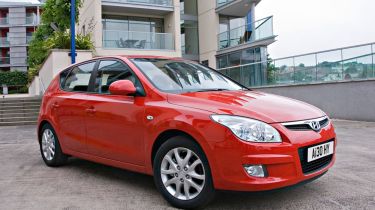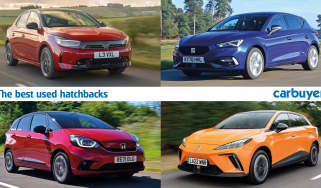Hyundai i30 hatchback (2007-2011)
"Watch out Volkswagen, the i30 proves Hyundai has got what it takes to make it to the top. All it lacks is a bit of design flair."
Pros
- Low price and brilliant warranty
- High levels of standard equipment
- Lots of cabin space
Cons
- No version is very quick
- Some cabin plastics could be better
- Interior design slightly bland
It’s competitively priced, but the Hyundai i30 is not a budget car - it’s much better than that! In fact, it was placed top in the 2010 Driver Power customer satisfaction survey, with owners heaping praise on the car's quality, reliability and low running costs. While it doesn’t quite offer the same sense of class or quality as a Volkswagen Golf - or offer the styling flair of a Honda Civic - it feels built to last. What's more the engine line-up is economical and the cabin is comfortable and spacious. Add to that a five-year unlimited mileage warranty and the i30 is well worth considering.
MPG, running costs & CO2
The diesel engines offer impressively low fuel costs and tax rates. They’re both 1.6-litres, with the 90bhp version returning 64.2mpg and 115g/km, while the 115bhp version returns 62.8mpg and 119g/km. Both are therefore in the £30 per year Road Tax band. Hyundai’s fuel-saving ISG start-stop system, which cuts the engine when you come to a standstill, is available as an option too. A five-year unlimited mileage warranty gives peace of mind and dealer service costs are reportedly low too.
Engines, drive & performance
The i30’s light controls make it seem effortless to drive. The cabin design well thought our too, placing all the controls high on the dash and close to the steering wheel. Overall, it feels well engineered, with a light-to-the-touch clutch pedal, easily engaged gears, positive brakes and predictable steering. The 90bhp 1.6 CRDi diesel can feel lethargic and slow, but the more powerful 115bhp version is the pick of the range. In contrast, there isn’t much difference between the 1.4 and 1.6-litre petrol engines - both require a lot of throttle to get the best from them.
Interior & comfort
The way the i30 keeps wind and tyre noise at bay, even at motorway speeds, is admirable. There’s a little body roll around corners, but the suspension does a good job of making uneven roads feel smooth. The two diesel engines are quiet at idle and remain so on the move, but the petrol engines aren’t quite as impressive, sounding harsh at higher revs. All occupants will benefit from the i30’s spacious cabin, which has loads of headroom and plenty of rear legroom – which is usually a weak point for many family hatchbacks.
Practicality & boot space
The 340-litre boot is about average for the class, but all i30s have five-doors and there’s useful storage spaces dotted around the cabin: a sunglasses holder; a cooled glovebox; a closable compartment above the stereo; two cup-holders integrated into the fold-down rear armrest; a box underneath the front arm rest; and a pair of map pockets. It’s been well thought out.
Reliability & safety
Six airbags, anti-whiplash head restraints and electronic stability control help give the i30 its five-star Euro NCAP rating. The reliability results of the 2010 Driver Power survey also show that buyers should have no issue with the i30’s quality - it placed 9th, higher than the Jaguar XF. Only the hard lower level plastics and slightly flimsy indicator stalks give the Hyundai’s budget price away.
Price, value for money & options
Hyundai offers three trim levels - Classic, Comfort and Premium - and each is well equipped. Even entry-level Classic cars are generously equipped, with air-conditioning, electric windows and electronic stability control as standard. Alloy wheels are added with Comfort specification. Premium cars get climate control, rear parking sensors, rain-sensing wipers and heated front seats. All of this comes for less than the price many makers charge for their most basic family hatchbacks.













